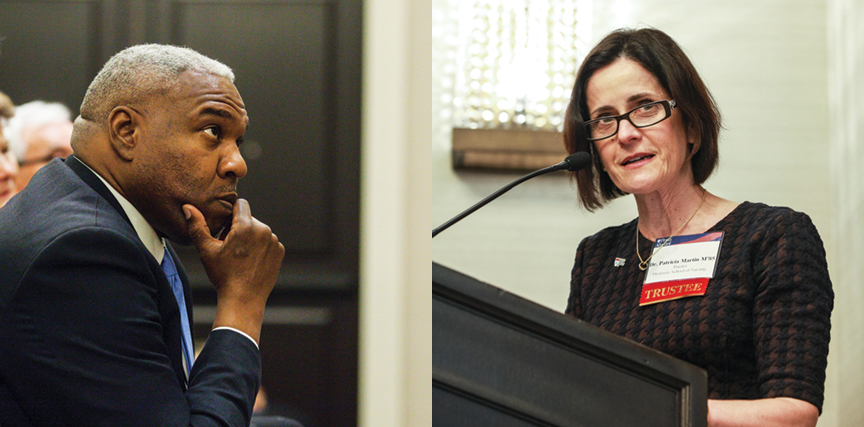
For a group of alumni volunteer leaders, the mission to improve campus for people of color continues.
When Michael Barrett EAS’89 thinks about his time at Penn, his mind often wanders to the undergraduate engineering lectures he sat through—and how intimidating they often felt to him as a Black student in a mostly white room. “I remember sitting in a very large classroom and hearing one of my administrators say, ‘Look to the left and look to the right. One of you won’t be here next year.’ It was a way to weed out students,” Barrett says. “But I’ve always felt that if you were able to get to Penn and successfully matriculate there, why should it be that we think of ways to weed you out?”
Now, Barrett ponders that question on a near-daily basis. And as cochair of the James Brister Society (JBS), he works alongside fellow JBS cochair and Penn Trustee Patricia Martin M’85 and more than 150 other alumni to promote a more welcoming and culturally diverse University.
Founded in 1993 and named after James Brister D1881, the first African American to earn a Penn degree, the group’s stated goals include advocating for the advancement of and improving the environment for faculty, students, and administrators from diverse backgrounds; strengthening alumni affiliations with the University and promoting mentoring and networking between alumni and students; and encouraging the University to utilize alumni from diverse backgrounds as leaders.
Unlike other alumni groups, JBS members must have graduated at least a decade prior to joining and are required to serve on another volunteer board or committee. Of the 158 current members, nine serve on the board of trustees and 15 as overseers for Penn’s various schools. “At least for me, the way I grew up, I didn’t have family that served on a board,” says Martin, a Latina physician. “This is something very new. And it was the people before me who led me and told me how to do it and what was expected of me. It was a real learning experience, and we want to pass that on.”
While anti-racism is embedded into JBS’s mission, the issues of police brutality and the protests for racial justice this past summer brought it into sharper focus. “Now there’s a special hunger from the entire community to know more,” says Martin. “For many people, they have never thought about this before. So this is a moment for us to fill that void and provide the content people want, which is what we’ve been trying to do for the past few months.”
JBS has hosted online events featuring experts on subjects such as voter suppression and educational disparities in virtual learning. And they plan to partner with Penn Spectrum, the Black Alumni Society, and the Association of Latino Alumni (ALA) for other programming on issues related to the coronavirus pandemic’s disproportionate effect on minorities, heightened racial tensions, and more. (For more on Brister Society events, visit alumni.upenn.edu/jbs.)
“We collaborate. We try to find places for us to intersect,” Barrett says. “Even if you’re in the Black Alumni Society or ALA or PAACH [Pan-Asian American Community House], you can be a member of JBS as well. We think about how to do more programs together because, at the end of the day, we have the same mission: to help students of color and alumni really make a difference in how they give their time and leadership perspective.”
Martin and Barrett’s proudest JBS moments are the ones that connect them with the student body. Through fundraising events, the group raises money that goes “directly towards closing the gap of student needs” by way of two scholarship funds: the James Brister Society Endowed Scholarship and the James Brister Society Emergency Grant Fund. The latter has always worked to support students facing economic hardships that jeopardize academic success, but in the age of COVID-19, it became essential to students who bore the brunt of the virus’s economic impact.
“As the pandemic hit in March of this year, we had an outpouring of requests from students that really needed money on an emergency basis to try to get back home, or get Wi-Fi, or figure out alternative living arrangements, or be able to think about books and things they needed,” Barrett says. “We were able to really step up through the giving of our member base as part of those fundraising campaigns to support those students.”
Ultimately, Martin and Barrett want to strengthen the pipeline they’ve created for alumni of color to the University’s most influential boards and fully integrate communities of color into the alumni structure. That way, the lived experiences of former students of color can better guide Penn’s approach to issues of social justice.
“We always talk about the phrase ‘there’s strength in numbers.’ But there’s strength in diversity as well—in diversity of thought, diversity of color, diversity of background,” Barrett says. “That’s an important pillar that all of us want to strive for. As we look back at our undergraduate or graduate years here, we ask ourselves, ‘How do we make sure that we’ve left a mark? How do we ensure that the people here today go farther than we did?’”
—Beatrice Forman C’22

